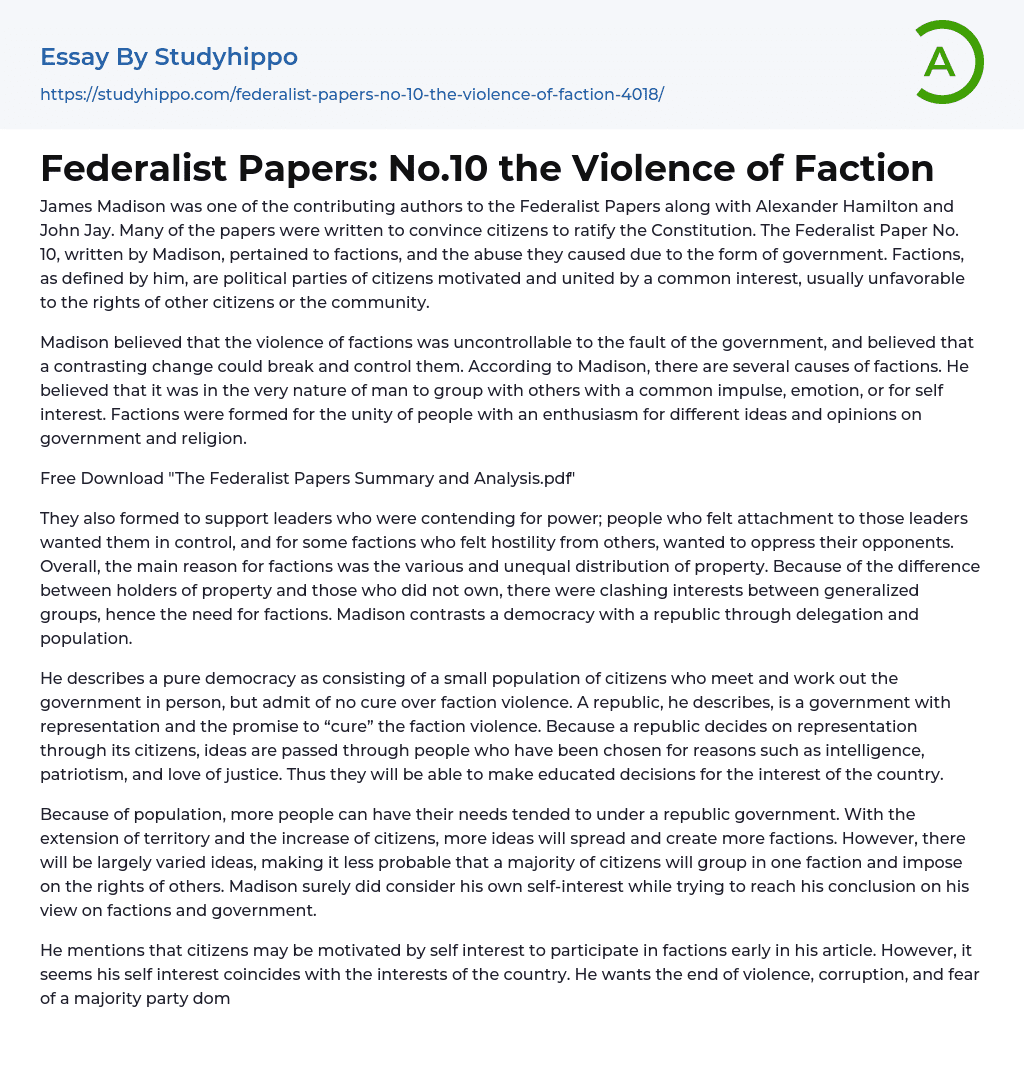

Federalist Papers: No.10 the Violence of Faction Essay Example
James Madison was one of the contributing authors to the Federalist Papers along with Alexander Hamilton and John Jay. Many of the papers were written to convince citizens to ratify the Constitution. The Federalist Paper No. 10, written by Madison, pertained to factions, and the abuse they caused due to the form of government. Factions, as defined by him, are political parties of citizens motivated and united by a common interest, usually unfavorable to the rights of other citizens or the community.
Madison believed that the violence of factions was uncontrollable to the fault of the government, and believed that a contrasting change could break and control them. According to Madison, there are several causes of factions. He believed that it was in the very nature of man to group with others with a common impulse, emotion, or for self interest. Factions were formed for the unity of people w
...ith an enthusiasm for different ideas and opinions on government and religion.
Free Download "The Federalist Papers Summary and Analysis.pdf"
They also formed to support leaders who were contending for power; people who felt attachment to those leaders wanted them in control, and for some factions who felt hostility from others, wanted to oppress their opponents. Overall, the main reason for factions was the various and unequal distribution of property. Because of the difference between holders of property and those who did not own, there were clashing interests between generalized groups, hence the need for factions. Madison contrasts a democracy with a republic through delegation and population.
He describes a pure democracy as consisting of a small population of citizens who meet and work out the government in person
but admit of no cure over faction violence. A republic, he describes, is a government with representation and the promise to “cure” the faction violence. Because a republic decides on representation through its citizens, ideas are passed through people who have been chosen for reasons such as intelligence, patriotism, and love of justice. Thus they will be able to make educated decisions for the interest of the country.
Because of population, more people can have their needs tended to under a republic government. With the extension of territory and the increase of citizens, more ideas will spread and create more factions. However, there will be largely varied ideas, making it less probable that a majority of citizens will group in one faction and impose on the rights of others. Madison surely did consider his own self-interest while trying to reach his conclusion on his view on factions and government.
He mentions that citizens may be motivated by self interest to participate in factions early in his article. However, it seems his self interest coincides with the interests of the country. He wants the end of violence, corruption, and fear of a majority party dominating the country; he wants the government as a republic to expand territory and naturally balance out the problems with factions. Because he is in support of the Constitution, he sees the republic as best for the country and not only for his own self gain.
- Media Violence essays
- Domestic Violence essays
- Violence in Video Games essays
- Gun Violence essays
- Video Game Violence essays
- Violence Against Women essays
- Youth Violence essays
- Caste System essays
- Citizenship essays
- Civil Society essays
- Community essays
- Culture essays
- Deviance essays
- Discourse Community essays
- Female essays
- Filipino People essays
- Igbo People essays
- Indigenous Australians essays
- Indigenous Peoples essays
- Men essays
- Middle Class essays
- Minority Group essays
- Modern Society essays
- Popularity essays
- Social Control essays
- Social Institution essays
- Social Justice essays
- Social Norms essays
- Social Responsibility essays
- Socialization essays
- The nation essays
- Abraham Lincoln essays
- Andrew Jackson essays
- Barack Obama essays
- Bill Clinton essays
- Donald Trump essays
- Franklin D. Roosevelt essays
- George W. Bush essays
- George Washington essays
- James Madison essays
- John F. Kennedy essays
- Lyndon B. Johnson essays
- Richard Nixon essays
- Theodore Roosevelt essays
- Thomas Jefferson essays
- Vice President essays
- Absolutism essays
- Appeal essays
- Bourgeoisie essays
- Contras essays



